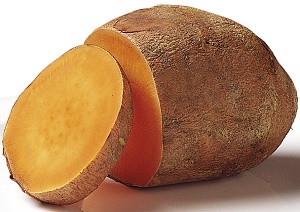Sweet Potato Wastewater May Help Weight Loss
Sweet Potato Wastewater May Help Weight Loss
December 14, 2016 at 10:02 AM
 Sweet potatoes can be delicious, whether they’re baked in pies, put in a casserole, or just eaten by themselves. These root vegetables, though, are also high in nutrients such as vitamin A. Now, a new study has found that starchy water that’s left over from cooking sweet potatoes may actually help with digestion.
Sweet potatoes can be delicious, whether they’re baked in pies, put in a casserole, or just eaten by themselves. These root vegetables, though, are also high in nutrients such as vitamin A. Now, a new study has found that starchy water that’s left over from cooking sweet potatoes may actually help with digestion.
New Sweet Potato Study
In this latest study, researchers form the National Agriculture and Food Research Associated looked at ways to reuse the wastewater that results from processing sweet potatoes on an industrial scale. More specifically, they looked at how the wastewater could be beneficial in its nutritional properties. This wastewater possesses the proteins found in sweet potatoes, so researchers look at its effects on mice.
In this case, the researchers fed three groups of mice high-fat diets. One of the groups was given the sweet potato peptide protein (SPP) in a high concentration while another group was given this protein in a low concentration. The third group was not given the protein.
At the end of the study, the researchers weighted the mice and took several measurements. In the end, they found that the mice that were fed higher levels of SPP had much lower body weight and liver mass.
How Sweet Potatoes are Beneficial
While more work needs to be conducted to see whether or not this treatment has the same effect on humans, sweet potatoes are still beneficial in terms of nutrients and also starch levels. They have high levels of both vitamin A and vitamin C, and are also a source of potassium. In addition, they don’t cause blood sugar spikes like other sweet items.
Like all foods, make sure to eat sweet potatoes in moderation, and also be careful of the toppings you put on them. While sweet potatoes may be healthy, dousing them in brown sugar and butter will make them less than idea for someone following a healthy diet.
Healthy Eating Habits
If you’re looking for tips to help you toward a healthier lifestyle, then consider contacting Medical Weight Loss Solutions. We offer comprehensive programs that are personalized to what you need.


